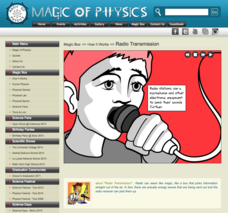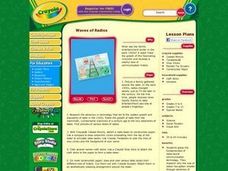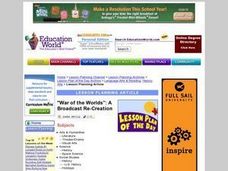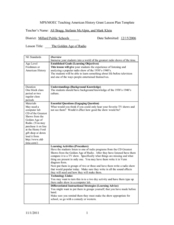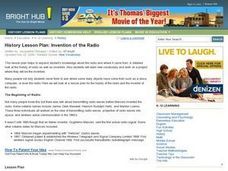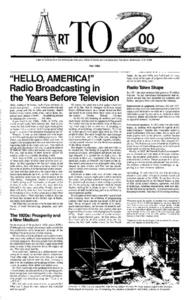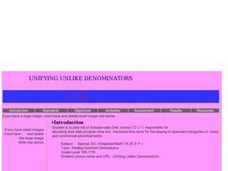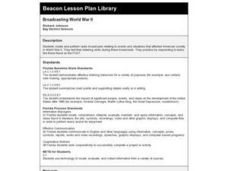Carolina K-12
The Major Conferences of World War II
Young historians create a 1940's news radio broadcast on the five major World War II conferences, including the Atlantic, Casablanca, Tehran, Yalta, and Potsdam.
PBS
Master of the Airwaves: How FDR Used Radio to Ease the Public’s Fears
The political and economic climate during the 1930's was uncertain and tumultuous. But Americans' minds and hearts were eased with the reassuring words of their president, Franklin D. Roosevelt, and addresses over the radio. High...
Curated OER
Jazz Music and the Crisis Over School Desegregation
High schoolers will learn to appreciate the civil rights movement with a focus on Little Rock, Arkansas. They will also acknowledge Louis Armstrong's unparalleled contributions to American music.
Carolina K-12
World War II through the Radio Waves
Young historians channel the very medium used to convey news during World War I. They create and present a five-minute radio broadcast on a particular topic from the war, such as the roles of African Americans and women, war bonds,...
Newseum
Use ‘War of the Worlds’ to Teach Media Literacy
Orson Welles' 1938 radio broadcast of "War of the Worlds" is the focus of a lesson that looks at the importance of clarity in broadcasting. After listening to the radio broadcast, class members discuss the ethical obligations to...
Magic of Physics
Radio Transmission
Radio waves are all around us! How do they transmit sound? Using an interactive, scholars examine how songs travel through the air. The resource explains the process from the radio station, to signal towers, to the radio unit. A look at...
Curated OER
Radio Commercial Assignment
Testing, testing! Following the provided script, class members are asked to create a radio commercial, complete with sound effects and background music.
Curated OER
Waves of Radios
Learners grasp the fundamentals of radio/sound communication technology. They research why the size of radios has gotten smaller through advances of technology...from large radio tubes through transistors through microchips. Students...
Curated OER
Radio News
Part of a larger unit from the Media Awareness Network on media literacy, this particular lesson plan focuses on the medium of news radio. Small groups participate in discussions on their radio listening habits as well as the...
Curated OER
Radio: merit badge
In this radio worksheet, students use their workbook to answer short answer questions about the history of the radio. Students complete 21 questions total to get their merit badge.
Curated OER
Careers on Stage And Air
Students create and perform a scene for play using a common fairy tale for the story line. They view and discuss a video on careers in stage and radio to identify the roles and responsibilities for each of their group members.
Curated OER
"War of the Worlds": A Broadcast Re-Creation
Why did Orson Welles' 1938 Broadcast of a adaptation of H.G. Wells' The War of the Worlds cause such a panic? To answer this question, class members listen to the original broadcast and research the panic that resulted. They then engage...
Curated OER
Orchestrated Hell
Students evaluate a radio broadcast by correspondent Edward R. Murrow as a primary historic source. The broadcast, popularly known as "Orchestrated Hell" recounts Murrow's experiences with a Royal Air Force bomber crew on a raid over...
Curated OER
Radio Free School
Students explore radio news formats, styles, and sequences, and then write segments for a student-centered news radio program. In small groups, students develop and write news segments for a student-centered radio program.
Curated OER
Fundamentals of Radio Communication
Twelfth graders explain the role of electromagnetic waves and antenna in radio communication. In this lesson, 12th graders examine circuit diagrams and solve wave related problems. They also calculate theoretical antenna length for...
Curated OER
The Golden Age of Radio
Eleventh graders analyze popular radio shows of the 1930’s-1940’s. In this American History lesson, 11th graders examine life before television and one of the ways people entertained themselves. Students present their radio show as a...
Curated OER
Invention of the radio
Eighth graders study the radio and where it came from. In this American History lesson, 8th graders explore the history of the radio. Students create an invention that will be useful to them today.
Curated OER
Technology and Invention in Entertainment
In this technology and invention learning exercise on entertainment, students describe the features of a gramophone and record player shown in a photograph. Then they identify and list what inventions have replaced them for listening to...
Curated OER
Two for One Box Company
Students draw a net (a two-dimensional pattern that can be formed to make a solid) for making an open top box on grid paper. They cut out the net and fold up each side to form the open box and tape the sides, then find the volume of the...
Curated OER
Radio
Students explain in their own words how radios work. In this technology instructional activity, students discuss the importance of radio today. They differentiate AM and FM bands.
Curated OER
Radio Broadcasting Before Television
Students compare the radio to other forms of mass communication. In this Radio Broadcasting Before Television lesson, students learn the different types of radio shows in the 1920s and 30s. Students write and perform radio scripts...
Curated OER
Stage 1: Get the Message Out, Create a Radio Commerical
Student create a radio commerical. They think of ways they want to communicate to people about waste. Student find a fun and creative way to reinforce the challenge of waste. They work in small groups to create a radio commerical that...
Curated OER
Unifying Unlike Denominators
Students play roll of fictional radio disk jockeys. They allocate their daily program time into fractional time slots for the playing of specified catagories of music and commercial advertisements.
Curated OER
Broadcasting World War II
Third graders listen to several broadcasts from the WWII era. They research, write and perform simulated radio broadcasts concerning topics related to American society in World War II.







